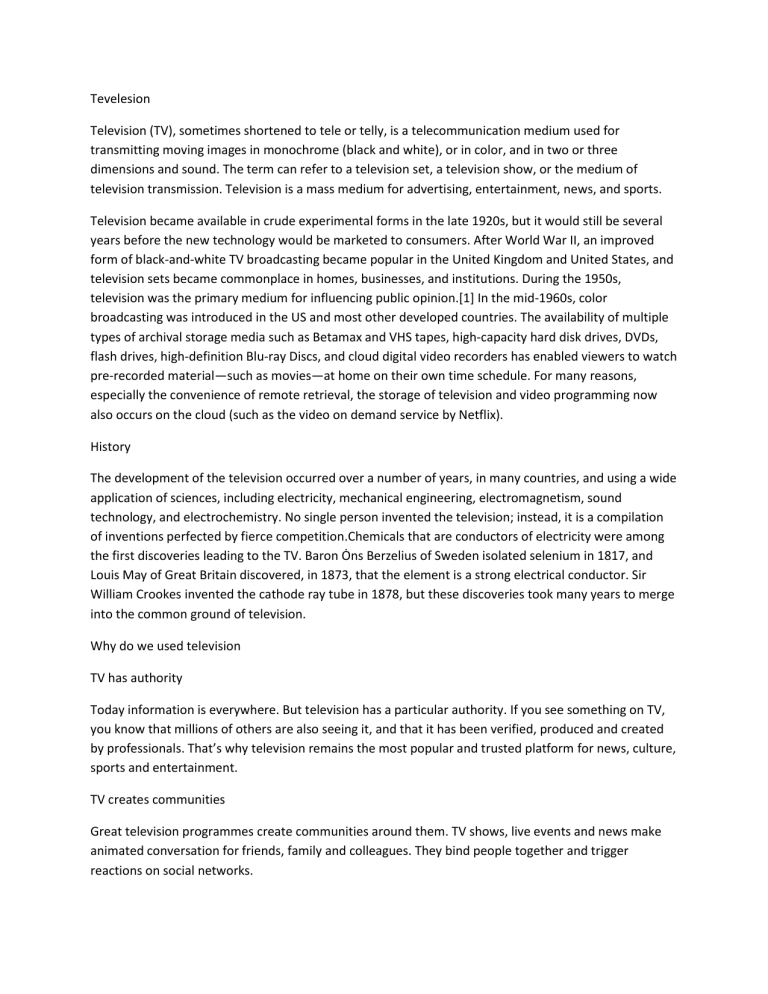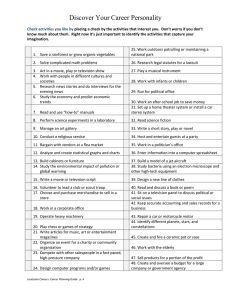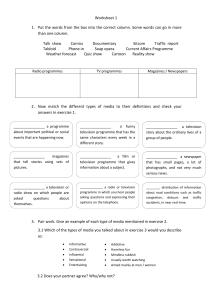
Tevelesion Television (TV), sometimes shortened to tele or telly, is a telecommunication medium used for transmitting moving images in monochrome (black and white), or in color, and in two or three dimensions and sound. The term can refer to a television set, a television show, or the medium of television transmission. Television is a mass medium for advertising, entertainment, news, and sports. Television became available in crude experimental forms in the late 1920s, but it would still be several years before the new technology would be marketed to consumers. After World War II, an improved form of black-and-white TV broadcasting became popular in the United Kingdom and United States, and television sets became commonplace in homes, businesses, and institutions. During the 1950s, television was the primary medium for influencing public opinion.[1] In the mid-1960s, color broadcasting was introduced in the US and most other developed countries. The availability of multiple types of archival storage media such as Betamax and VHS tapes, high-capacity hard disk drives, DVDs, flash drives, high-definition Blu-ray Discs, and cloud digital video recorders has enabled viewers to watch pre-recorded material—such as movies—at home on their own time schedule. For many reasons, especially the convenience of remote retrieval, the storage of television and video programming now also occurs on the cloud (such as the video on demand service by Netflix). History The development of the television occurred over a number of years, in many countries, and using a wide application of sciences, including electricity, mechanical engineering, electromagnetism, sound technology, and electrochemistry. No single person invented the television; instead, it is a compilation of inventions perfected by fierce competition.Chemicals that are conductors of electricity were among the first discoveries leading to the TV. Baron Ȯns Berzelius of Sweden isolated selenium in 1817, and Louis May of Great Britain discovered, in 1873, that the element is a strong electrical conductor. Sir William Crookes invented the cathode ray tube in 1878, but these discoveries took many years to merge into the common ground of television. Why do we used television TV has authority Today information is everywhere. But television has a particular authority. If you see something on TV, you know that millions of others are also seeing it, and that it has been verified, produced and created by professionals. That’s why television remains the most popular and trusted platform for news, culture, sports and entertainment. TV creates communities Great television programmes create communities around them. TV shows, live events and news make animated conversation for friends, family and colleagues. They bind people together and trigger reactions on social networks. TV inspires the mind Television is a fantastic educational tool. It broadens knowledge of different cultures, promotes tolerance and global understanding of international issues. Through current affairs, discovery, lifestyle, cooking shows and children’s programmes, television encourages scientific and cultural curiosity. TV delivers quality Thanks to the hard work of talented people on and off-screen, building on decades of experience and on new ways of working and communicating with audiences, the production quality of television programming have never been better than it is today. TV gives a voice to good causes Thanks to its unrivalled reach and emotional power, television enables effective calls for action during humanitarian crises, natural disasters and social emergencies. It reaches out to society through programmes and communication campaigns on the environment, healthy eating, physical activity, responsible sexual attitudes and responsible alcohol consumption, and many others. TV goes hand-in-hand with sport Without television, professional sport would be unrecognisable. Millions enjoy watching live sport every week from all parts of the world in ever-higher picture quality, and enjoy the sense of unity that sports coverage creates. Televised sport has other benefits: it promotes sport’s values and ethics, and it inspires people to follow healthy role models. TV stimulates the economy The global media sector of which television is a major part employs millions of skilled workers across the world. In addition, the success of commercial television as an advertising medium generates revenue which can be reinvested in even more great programming for viewers. Advantage and disadvantage of television Advantages of Television In this busy, expensive life, television is an easy and cheap source of entertainment. By watching international news, we are kept informed and up-to-date with breaking news around the world. Some shows and channels (like PBS and Discovery) offer educational programs that can increase our knowledge and make us more aware of the world around us. Do-it-yourself shows give us easy access to all kinds of information: Cooking channels offer new recipes and methods, home improvement shows introduce us to many money-saving DIY tips, and financial advisers give advice for managing finances and investing money, for example. Television can also be a good way to help people learn a different language. Disadvantage Television? Sex, crime, and violence are frequently depicted on television and may have negative effects on impressionable children (and adults!). Kids who see violent acts are more likely to display aggressive or violent behavior and also to believe that the world is a scary place and that something bad is going happen to them. Ongoing studies have shown a lasting correlation between watching violence on television and aggression that begins in childhood and continues into adulthood. Viewers sometimes imitate violent, criminal, sexual, or other risky behavior they see on television... and end up in trouble, in jail, or in a hospital as a result. Watching too much television is not good for your health. Studies have shown that there is a correlation between watching television and obesity. Excessive TV watching (more than 3 hours a day) can also contribute to sleep difficulties, behavior problems, lower grades, and other health issues. Television makes us antisocial, taking the place of family and friends.





